|
|
 |
 |
|
|
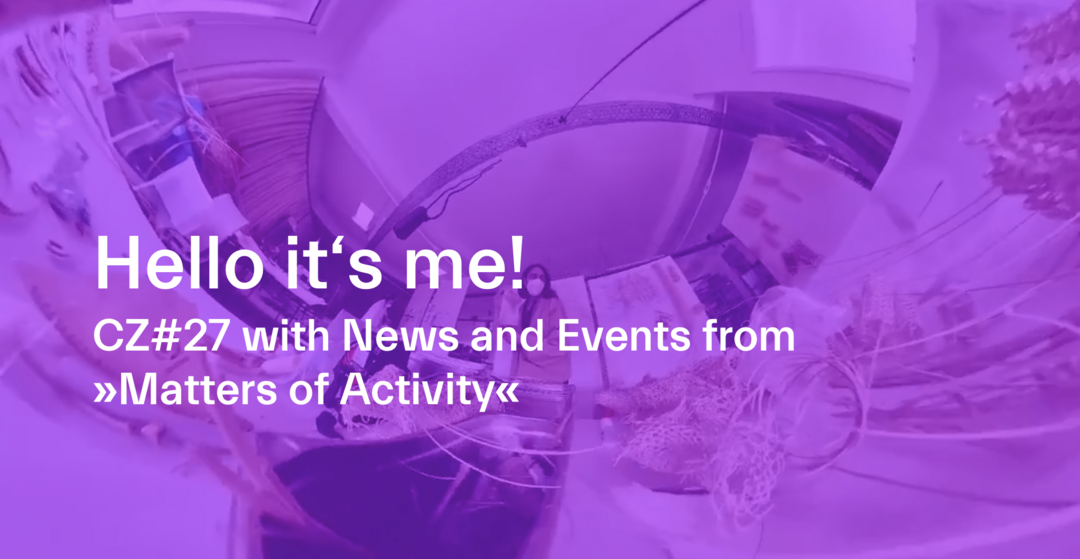
|
 |
Still from Trailer for Lab Tour »Stretching Materialities«. Copyright: Maxime Le Calvé
|
|
Editorial Dear friends of »Matters of Activity«,
Summer is finally here! Besides the digital lab tour of the exhibition »Stretching Materialities«, we are looking forward to the final presentation of the »Ultratool« studio project and the start of the new MoA Colloquia at weißensee school of art and design berlin as well as the grand finale of Peter Fratzl's lecture with an ideas workshop, all happening (still virtually) in the upcoming weeks.
Happy reading!
Antje Nestler, Carolin Ott & Franziska Wegener
|
 |
|
Liebe Freund:innen von »Matters of Activity«,
endlich ist der Sommer da! Neben dem digitalen Laborrundgang zur Ausstellung »Stretching Materialities«, freuen wir uns mit euch auf die Abschlusspräsentation des Studioprojekts »Ultratool« und den Start der neuen MoA Colloquia in der weißensee kunsthochschule berlin sowie das große Finale der Vorlesung von Peter Fratzl mit einem Ideen-Workshop – alles (digital) in den kommenden Wochen.
Gute Unterhaltung wünschen
Antje Nestler, Carolin Ott & Franziska Wegener
|
 |
|
|
|
|
 |
| Call for Ideas: Lecture Series »Interdependence of Structure and Function in Biological Materials« |
| Ideas Workshop Accompanying Lecture Series of Peter Fratzl |
 |
|
|
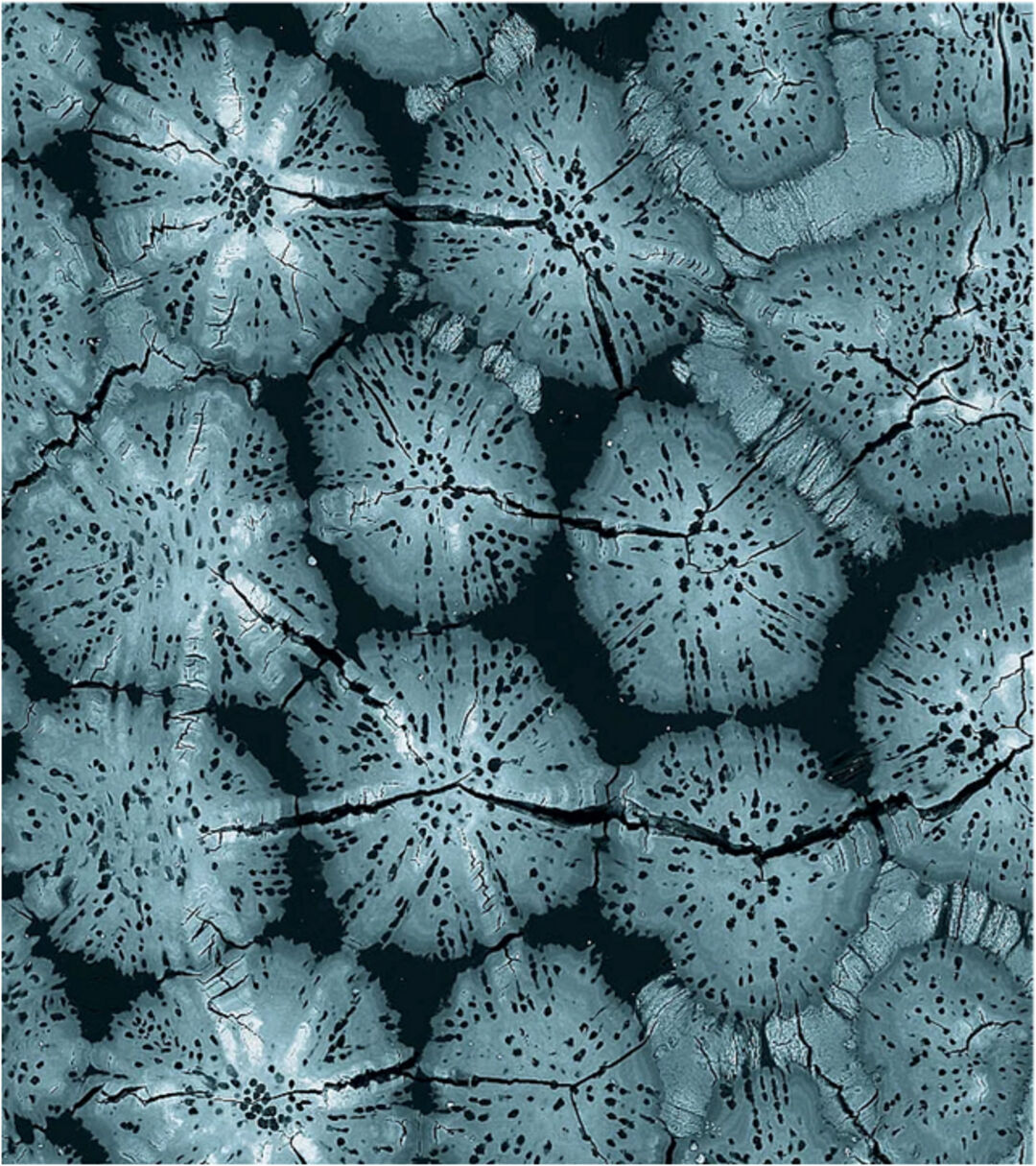
|
 |
Tesselation in biology. Copyright: Mason Dean, Max Planck Institute of Colloids and Interfaces; James Weaver, Wyss Institute
|
|
Event | Lecture Series Join us for the ideas workshop of the lecture series on → Interdependence of Structure and Function in Biological Materials by → Peter Fratzl.
Every second Tuesday at 4:15–5:45 pm, Cluster Co-Director Peter Fratzl gives a digital lecture at Humboldt-Universität zu Berlin. The lecture series started on April 13th, 2021 and addresses a pluridisciplinary audience, including sciences, design and cultural studies. All required basics from biophysics and biochemistry to mechanics are provided.
Biological materials adapt their structure to functional needs. The lectures introduce relevant structural features from molecular to macroscopic scales using examples for materials based on proteins or on polysaccharides, in particular cellulose and chitin. Some biological materials – like bone – are reinforced with minerals. The importance of hierarchical assemblies of building blocks, such as fibers and tessellations will be discussed.
All recordings of the lecture series can be found in the moodle course accompanying the series. Access to the moodle course can be granted via moa.public.relations@hu-berlin.de.
The ideas workshops on June 22nd and July 6th are part of the series and will summarize key geometric principles from biology which have been introduced in the sessions before. Participants are invited to translate these into concepts for their respective fields of research, such as design, mathematics, cultural history or art. These concepts should be presented in the last session on July 6th to the audience as a basis for interdisciplinary discourse. Participants who would like to receive credit points for this lecture need to participate in the ideas workshop.
Registration Date: 21 June 2021
Registration Contact: moa.public.relations@hu-berlin.de
|
 |
|
|
|
|
 |
| Ultratool – Why Calling it Phone? |
| Collaborative Studio Project with Students from the Dyson School of Design Engineering, Imperial College London, and weißensee school of art and design berlin |
 |
|
|
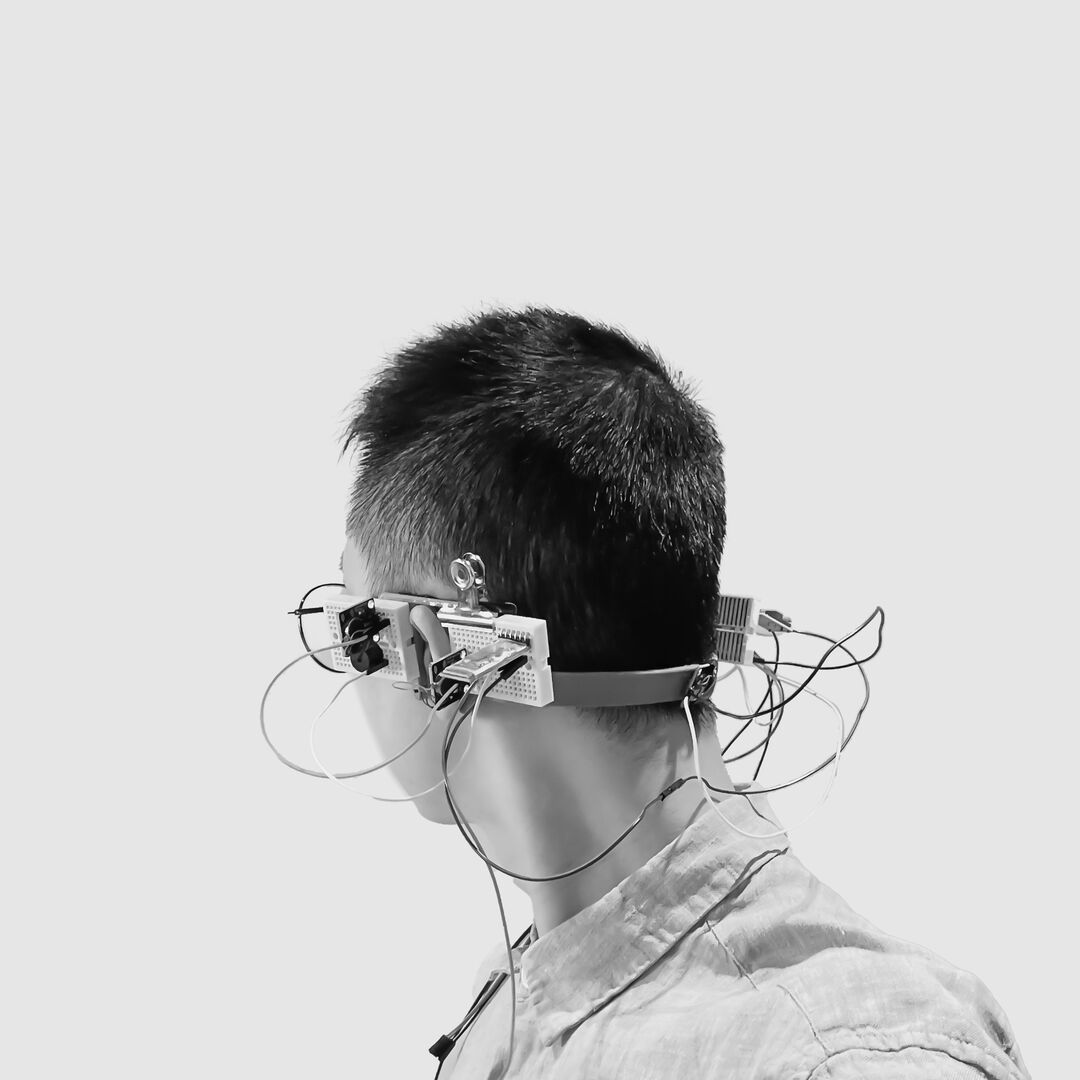
|
 |
WEON prototype. Copyright: Netta Gigi, Harrison Tan, Fu Yitao, Jehyun Kim
|
|
23.6.2021
|
 |
|
Filtering | Teaching | MoA Design Research Studio The phone call has taken a back seat as an interaction and is replaced by the multitude of applications such as navigation, healthcare, Internet of Things or social media. Various filters and filtering technologies interact simultaneously to shape our access and exchange with our environment. The studio project »Ultratool« addresses this development and investigates conditioning cultural and social behaviors within the technology ecosystem we live in. The aim of the project is to develop new product ideas and concepts, based on various analyses and design methods on technical and cultural aspects. »Ultratool« is a collaborative studio project of MoA Design Research Studio with students from the Dyson School of Design Engineering, Imperial College London, and weißensee school of art and design berlin. The final presentation was held on Wednesday, June 23rd, 2021 at 10.00 am–12.30 pm (CET).
→ more
|
 |
|
|
|
|
 |
| Worlds of Literature – Competing Notions of the Global |
| First Annual Conference of the Cluster of Excellence »Temporal Communities« |
 |
|
|
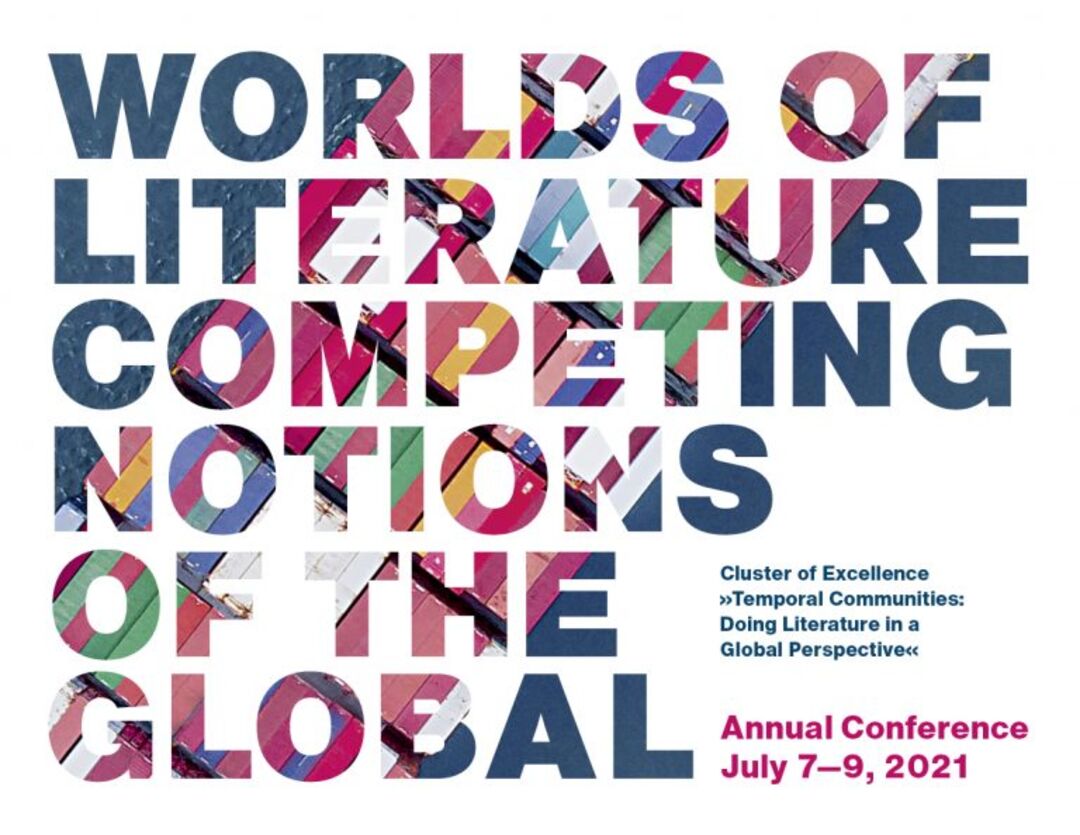
|
 |
Poster Annual Conference, Copyright: ExC Temporal Communities
|
|
With its first annual conference, »Worlds of Literature — Competing Notions of the Global«, the ↗ Cluster of Excellence EXC 2020: »Temporal Communities: Doing Literature in a Global Perspective↗ « turns to the question of how competing notions of the global have affected and continue to affect debates about ›world literature‹ and processes of transnational literary canonisation. The Cluster assumes that literature becomes global through its temporal entanglements. Accordingly, this first annual conference seeks to reflect and expand upon established theories of world literature by investigating spatiotemporal literary networks, their practices of communality, and their interaction with other arts and media. The conference brings together international scholars from a broad range of disciplines to discuss different historical, theoretical, and methodological framings of world literature with special regard to their competing conceptions of cosmopolitanism and globality.
Extending over three days, the conference is organized into daily themes:
- 7 July: focuses on Competing Notions of the Global.
- 8 July: is dedicated to Constructing ›Worlds of Literature‹.
- 9 July: addresses Temporalities and Scales of the Global.
The conference is entirely digital this year. Through this site, participants can access our digital meeting space to participate in live presentation and discussion sessions, view video introductions to our presenters, explore daily themes and programs, as well as read up on presenter bios and abstracts.
Access to live presentations requires registration, which can easily be completed ↗ here. Please register by July 1st. ↗ more
|
 |
|
|
|
|
 |
| Online Lecture Series »Talking Matters« |
| Next Talk with Media Theorist Marie-Pier Boucher on 13 July 2021 |
 |
|
|
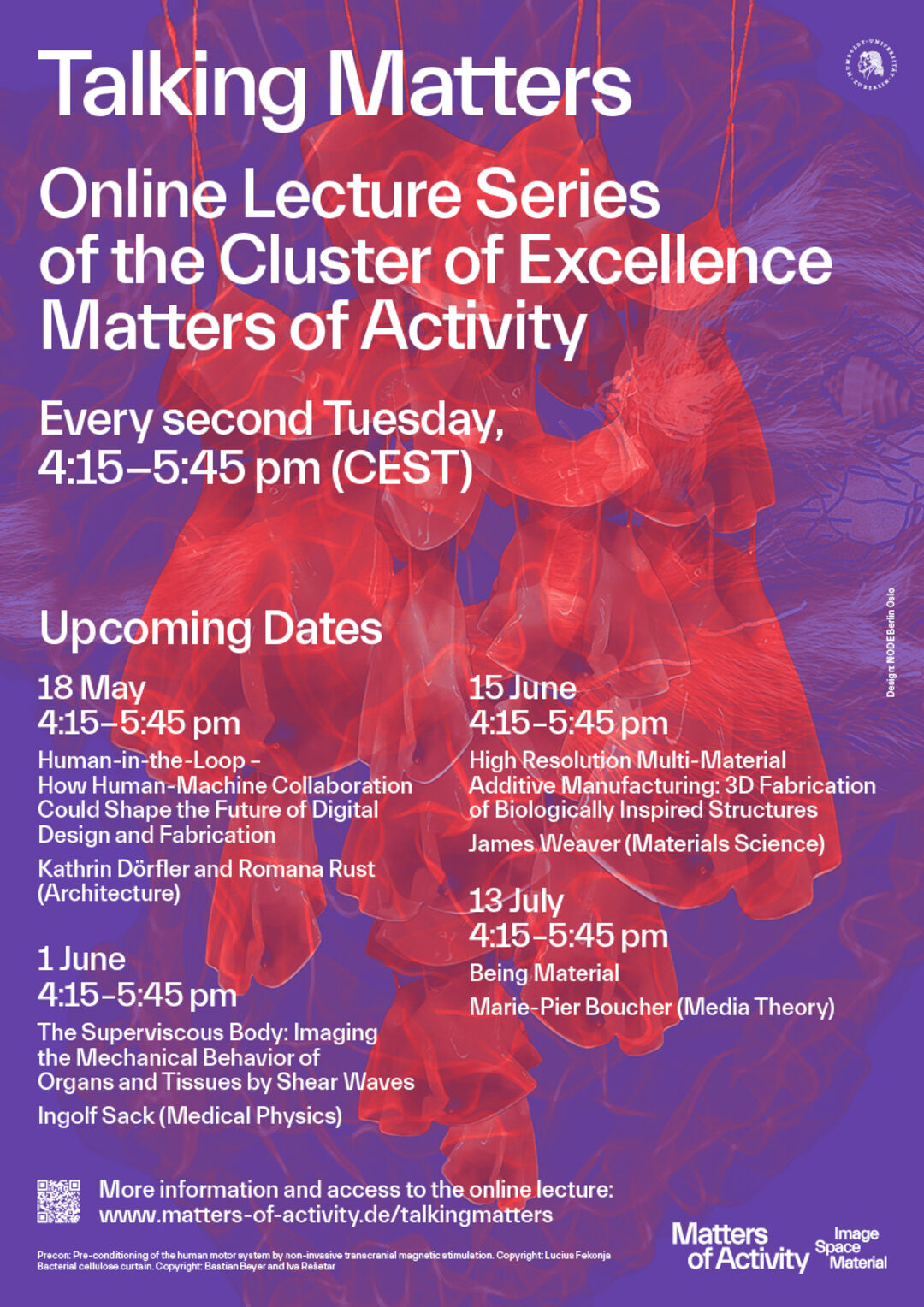
|
 |
Poster Online Lecture Series »Talking Matters«, Copyright: Lucius Fekonja, Bastian Beyer, Iva Rešetar, adapted by NODE Berlin
|
|
Event | Talking Matters For the new Cluster lecture series »Talking Matters« launched in May, our six Cluster projects invite external speakers from various disciplines to provide insights into their research related to central issues of »Matters of Activity«. In addition to researchers and students from various disciplines, the lecture series is open to anyone interested in our research.
For the last talk before the summer break on July 13th, we are happy to welcome media theorist Marie-Pier Boucher from the University of Toronto. Boucher will introduce us to »Being Material«, a curated collection of essays and artifacts that resulted from a symposium held in 2017 by the Center for Art, Science and Technology at MIT, where she was invited as co-editor and author on the project – a journey that brought her to explore the legacy of this institution in a different light.
Register now by sending an email to moa.public.relations@hu-berlin.de. → more
|
 |
|
|
|
|
|